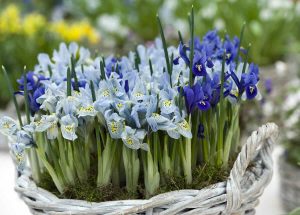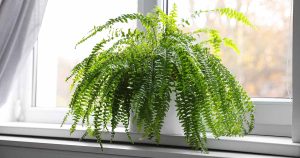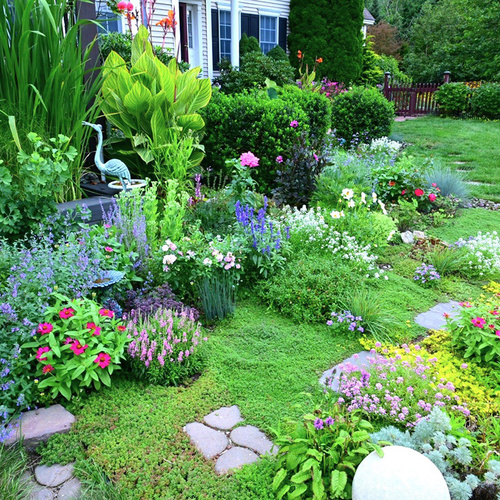
Hi GPODers!
Today we’re looking at a garden project sent in from Tingshu Hu in Dunstable, Massachusetts. Tingshu has shared other parts of her garden in the past, be sure to check out some of those here: Tingshu’s Massachusetts Garden, Flowering Trees in Tingshu’s Garden, Summer in Tingshu’s Front Garden and Summer in Tingshu’s Back Garden. In this submission, they detail a patch of lost lawn that was transformed into a lovely low-maintenance garden with the help of some gorgeous ground covers.
After losing a patch of lawn to grubs in June 2020, we decided to replace it with a low-maintenance garden. Initially, we planted some catmint (Nepeta spp. and cvs., Zones 3–8), tall sedum, sweet William (Dianthus barbatus, Zones 3–9), and maiden grass plants (Miscanthus sinensis ‘Gracillimus’, Zones 4–9), which were conveniently divided from the backyard, then temporarily covered the bare areas with mulch. Our goal was to eventually fill in the gaps with carefree and attractive ground covers as a permanent low-maintenance solution.
We tested several types of ground cover plants in the area. Three years later, two obvious winners emerged: Magic Carpet thyme (Thymus serpyllum ‘Magic Carpet’, Zones 4–9) and Baby Tears sedum (Sedum album chloroticum ‘Baby Tears’, Zones 4–9). With their delicate looks and miniature size (standing at 1 inch tall), they are exceptionally tough and carefree: drought-tolerant, pest-resistant, and with no known diseases. Additionally, they cover the ground very tightly, leave no room for weed seeds to grow, and eliminate the need for mulch.
For propagation, thyme may need some attention and watering after transplanting, but Baby Tears sedum needs none. You simply drop sedum leaves or plant sections onto the soil, they will take root and establish themselves. To make them grow faster, I sprinkled soil on top, pushed one end into the soil, and sprayed a little water. These two ground cover plants spread steadily and have a decent growth rate, they also have a tidy and carpet-like appearance, providing an ideal background for other showy plants.
In Spring 2023, I divided the thyme and Baby Tears sedum plants into many parts and transplanted them to the rest areas of the garden. Now, they have almost filled all the gaps. In 4 years, this once damaged lawn has transformed into a beautiful low-maintenance garden that is pest-free, weed-free, and drought-tolerant.
The picture above was taken on June 19, 2020, 9:30am. An umbrella was placed at the south edge to give the newly planted a little shade.
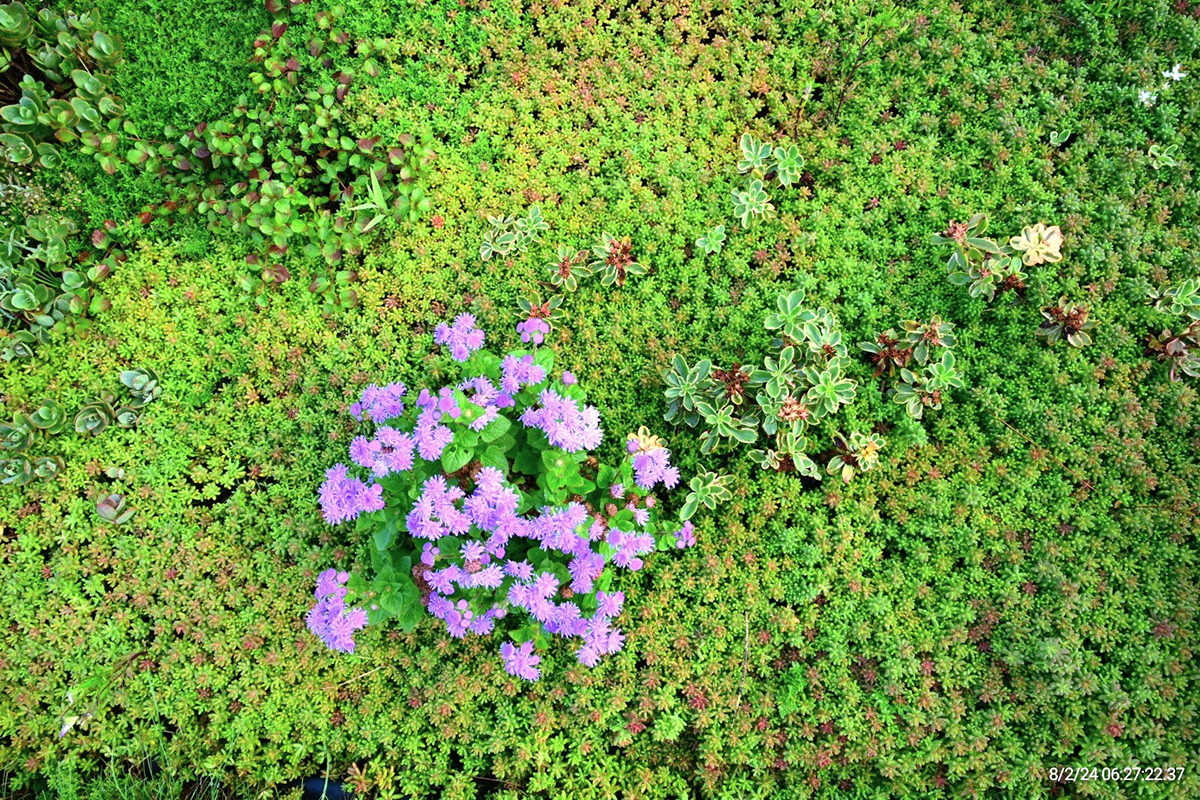 The picture above, taken on Aug. 2, 2024, shows a floss flower (Ageratum houstonianum, annual) in the middle of baby tears sedum. Some other varieties of sedums can also be seen in the picture, but they have lost the competition due to slower growth rate. The floss flower is one of my favorite annuals, tidy and bug free. The blue mound of flowers grows bigger and bigger until frost.
The picture above, taken on Aug. 2, 2024, shows a floss flower (Ageratum houstonianum, annual) in the middle of baby tears sedum. Some other varieties of sedums can also be seen in the picture, but they have lost the competition due to slower growth rate. The floss flower is one of my favorite annuals, tidy and bug free. The blue mound of flowers grows bigger and bigger until frost.
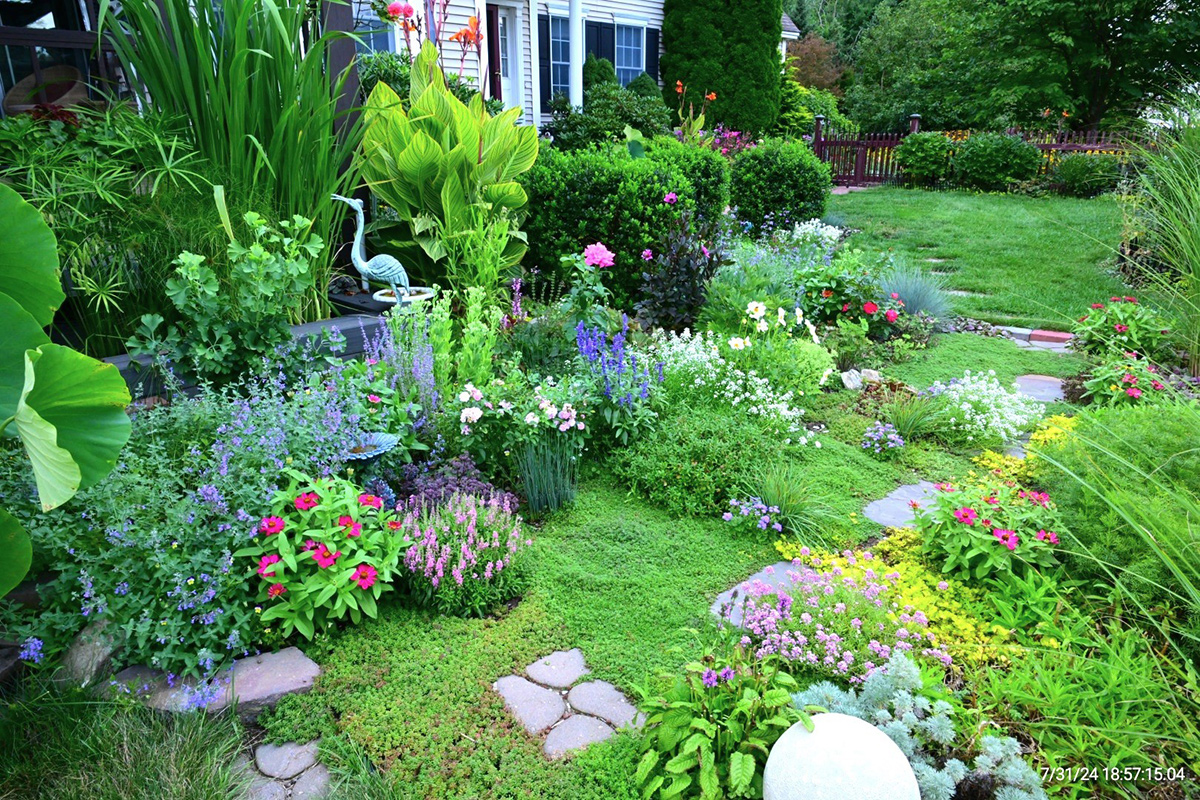 Picture above was taken on July 31, 2024, four years after the lawn was replaced. Almost all gaps have been filled with Baby Tears sedum and thyme. Most of the other plants are perennials, including catmint, lady’s mantle (Alchemilla mollis, Zones 3–7), veronica, betony, Russian sage (Perovskia atriplicifolia, syn. Salvia yangii, Zones 4–9), salvia, blue fescue (Festuca glauca, Zones 4–8), Ben Ledi rock rose (Helianthemum ‘Ben Ledi’, Zones 4–9), different varieties of taller sedum, and several rose bushes. I added a few annuals such as canna, dahlia, zinnia and floss flower for long time summer color. Sweet alyssum (Lobularia maritima, Zones 9–11 or as an annual) and sweet William come back every year by self-seeding.
Picture above was taken on July 31, 2024, four years after the lawn was replaced. Almost all gaps have been filled with Baby Tears sedum and thyme. Most of the other plants are perennials, including catmint, lady’s mantle (Alchemilla mollis, Zones 3–7), veronica, betony, Russian sage (Perovskia atriplicifolia, syn. Salvia yangii, Zones 4–9), salvia, blue fescue (Festuca glauca, Zones 4–8), Ben Ledi rock rose (Helianthemum ‘Ben Ledi’, Zones 4–9), different varieties of taller sedum, and several rose bushes. I added a few annuals such as canna, dahlia, zinnia and floss flower for long time summer color. Sweet alyssum (Lobularia maritima, Zones 9–11 or as an annual) and sweet William come back every year by self-seeding.
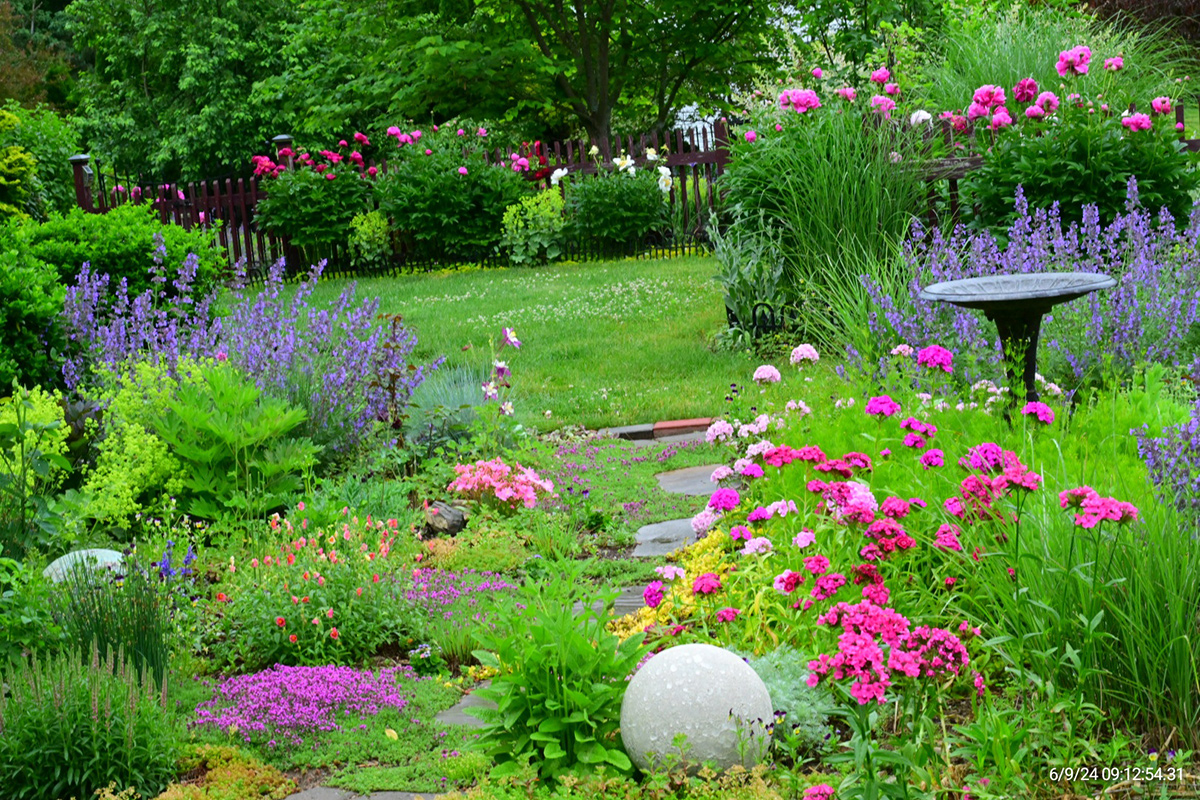 View from west side (June 9). In bloom are sweet William, catmint, lady’s mantle, rock rose and thyme. Sweet William has a long blooming period. After cutting the spent flower stems, it grows into a tidy compact form and acts as a ground cover.
View from west side (June 9). In bloom are sweet William, catmint, lady’s mantle, rock rose and thyme. Sweet William has a long blooming period. After cutting the spent flower stems, it grows into a tidy compact form and acts as a ground cover.
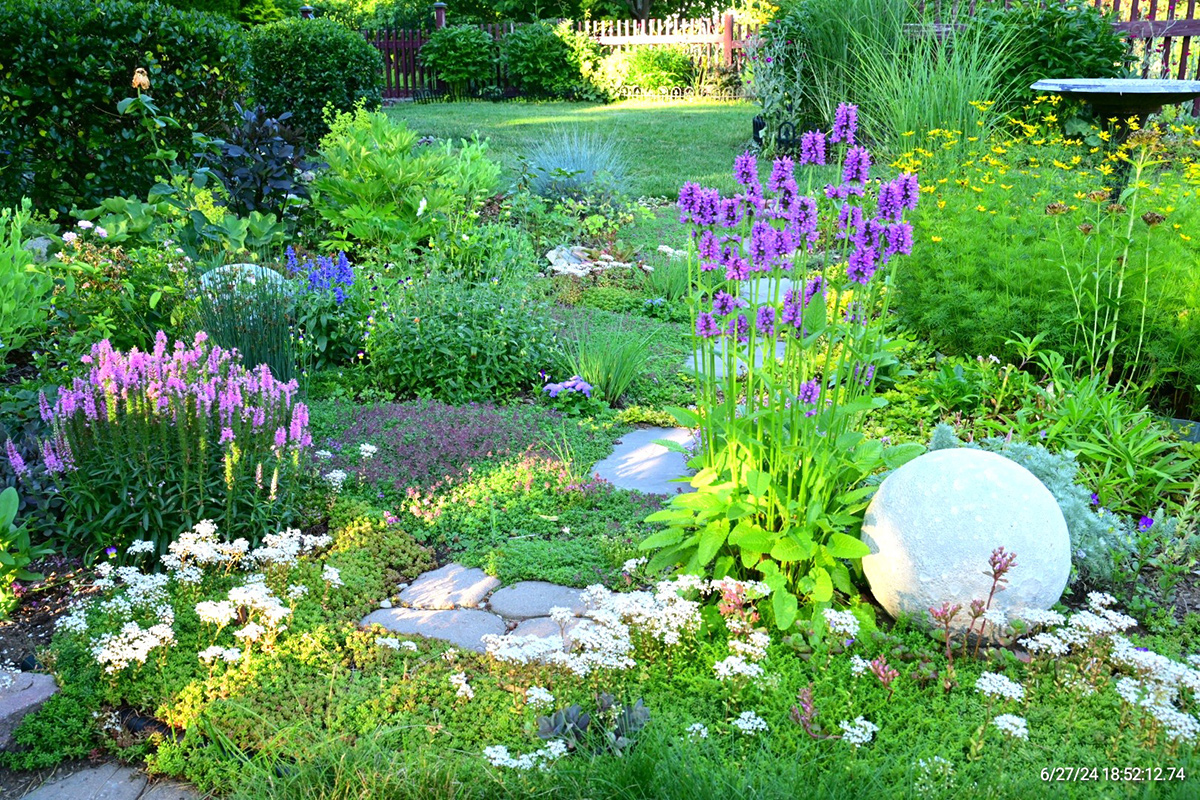 Veronica, betony and coreopsis are in bloom (June 27). The low white blooms are the flowers of Baby Tears sedum. The spent flowers can be easily pulled away without pulling up the plants, unlike other sedum plants, for which the spent flowers need to be cut with scissors.
Veronica, betony and coreopsis are in bloom (June 27). The low white blooms are the flowers of Baby Tears sedum. The spent flowers can be easily pulled away without pulling up the plants, unlike other sedum plants, for which the spent flowers need to be cut with scissors.
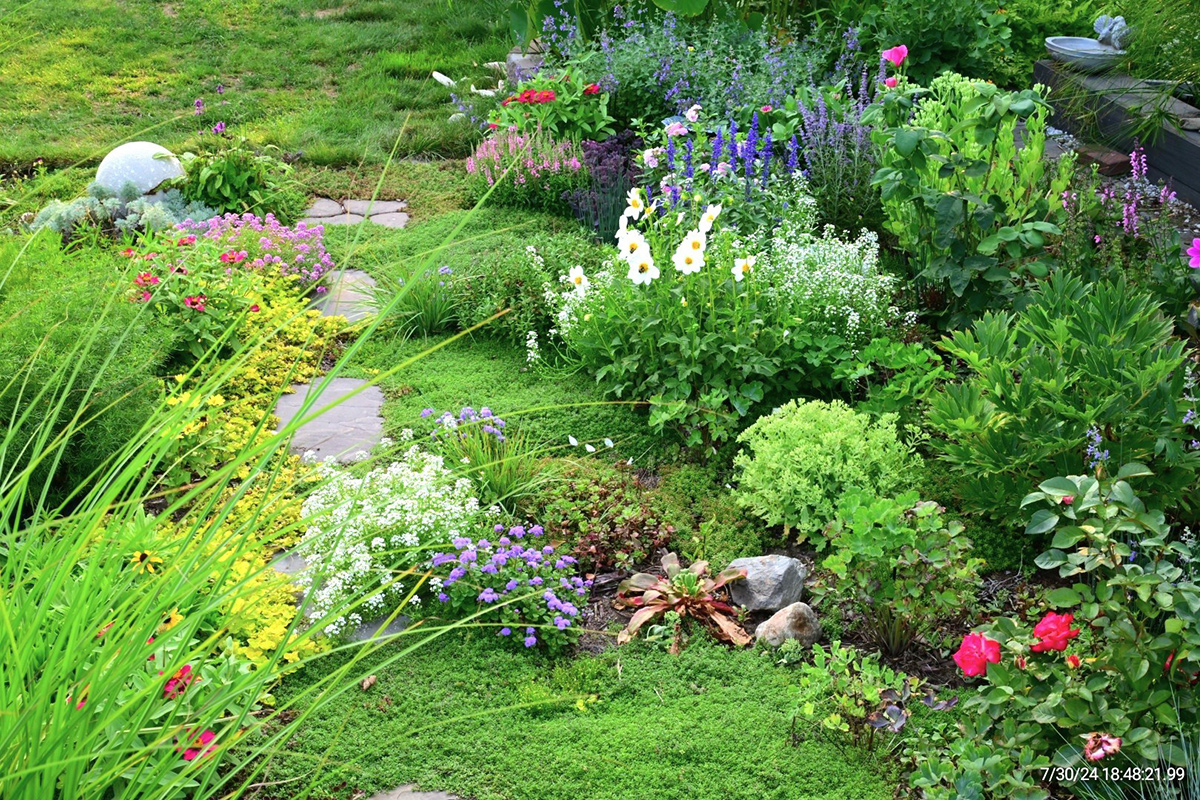 View from the east side (July 30). In the center are the white flowers of a dahlia plant.
View from the east side (July 30). In the center are the white flowers of a dahlia plant.
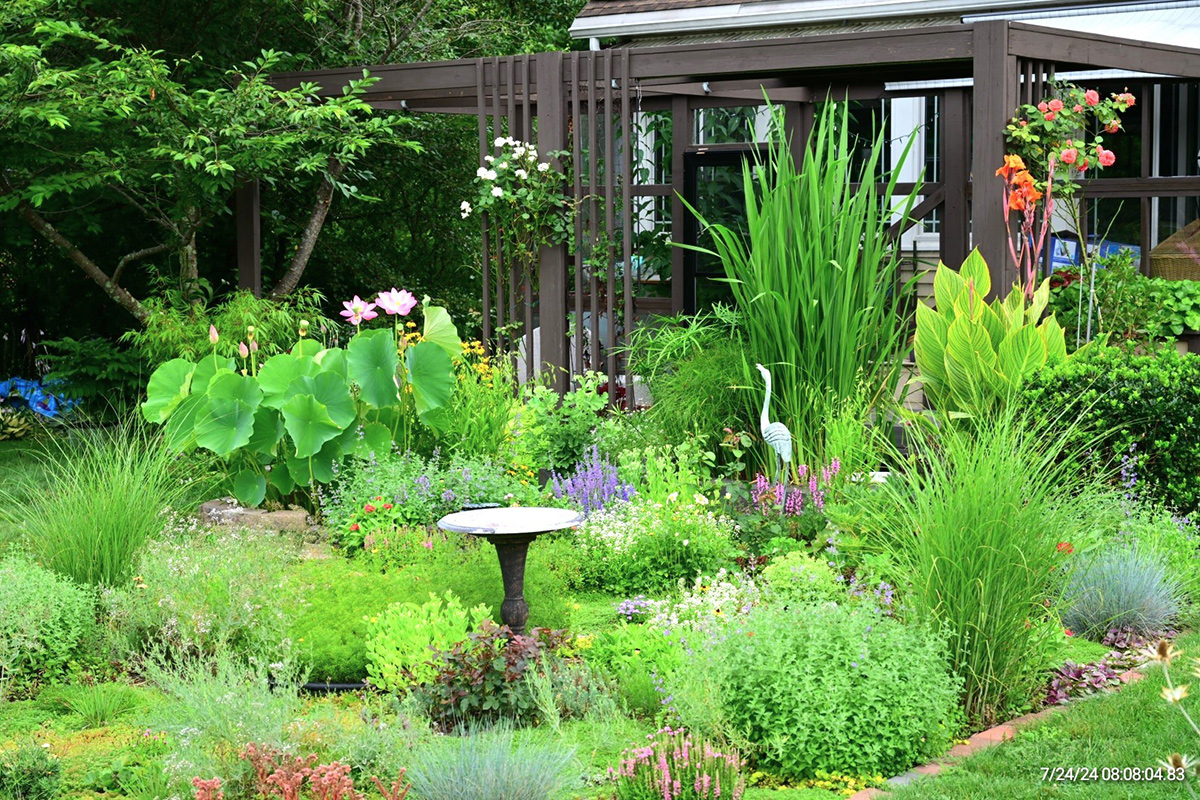 View from the southeast (July 24.) Purple flowers in the center are dwarf Russian sage, to its right is salvia with the second flush of flowers. At the bottom center are veronica with a second flush of flowers. Catmint was cut back to the crown after the first flush of flowers and has grown back to a round mound, started to flower again. Far away there is a pot of lotus (Nelumbo nucifera, Zones 4–10), buried to the ground level. I dig out the crowded roots once in a few years. Plant back only a few roots and stir fry the rest.
View from the southeast (July 24.) Purple flowers in the center are dwarf Russian sage, to its right is salvia with the second flush of flowers. At the bottom center are veronica with a second flush of flowers. Catmint was cut back to the crown after the first flush of flowers and has grown back to a round mound, started to flower again. Far away there is a pot of lotus (Nelumbo nucifera, Zones 4–10), buried to the ground level. I dig out the crowded roots once in a few years. Plant back only a few roots and stir fry the rest.
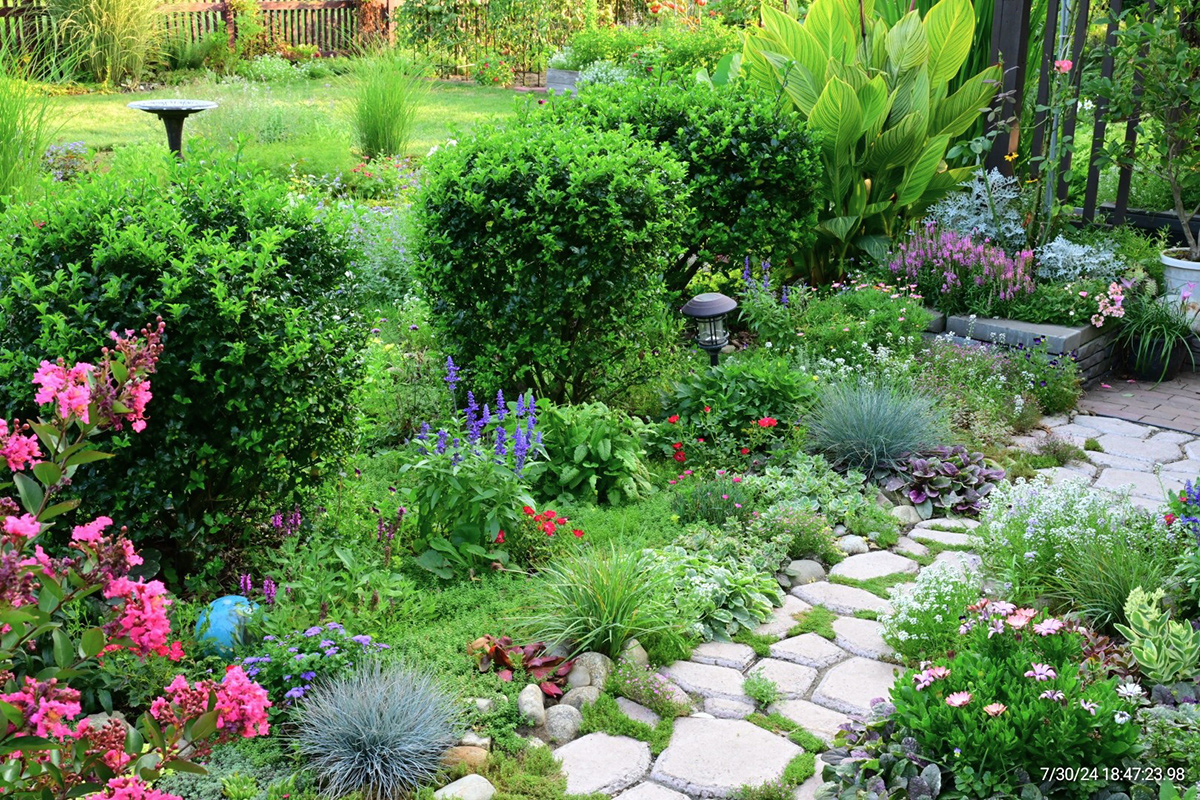 The ground covers in the previous garden area have been copied to other garden beds. The above picture shows a garden area by a walkway (July 30). We had creeping Jenny (Lysimachia nummularia, Zones 3–9) as ground cover for this area. Since the color of creeping Jenny doesn’t look very good in full sun and two much bright yellow color can be overwhelming, I replaced it with Baby Tears sedum in this April. After clearing out the creeping Jenny, I pulled some sections of Baby Tears sedum from the previous garden area, sprinkled them on the soil, added a thin layer of soil and watered the area a little bit. 3 months later, the gaps have almost all been filled with Baby Tears.
The ground covers in the previous garden area have been copied to other garden beds. The above picture shows a garden area by a walkway (July 30). We had creeping Jenny (Lysimachia nummularia, Zones 3–9) as ground cover for this area. Since the color of creeping Jenny doesn’t look very good in full sun and two much bright yellow color can be overwhelming, I replaced it with Baby Tears sedum in this April. After clearing out the creeping Jenny, I pulled some sections of Baby Tears sedum from the previous garden area, sprinkled them on the soil, added a thin layer of soil and watered the area a little bit. 3 months later, the gaps have almost all been filled with Baby Tears.
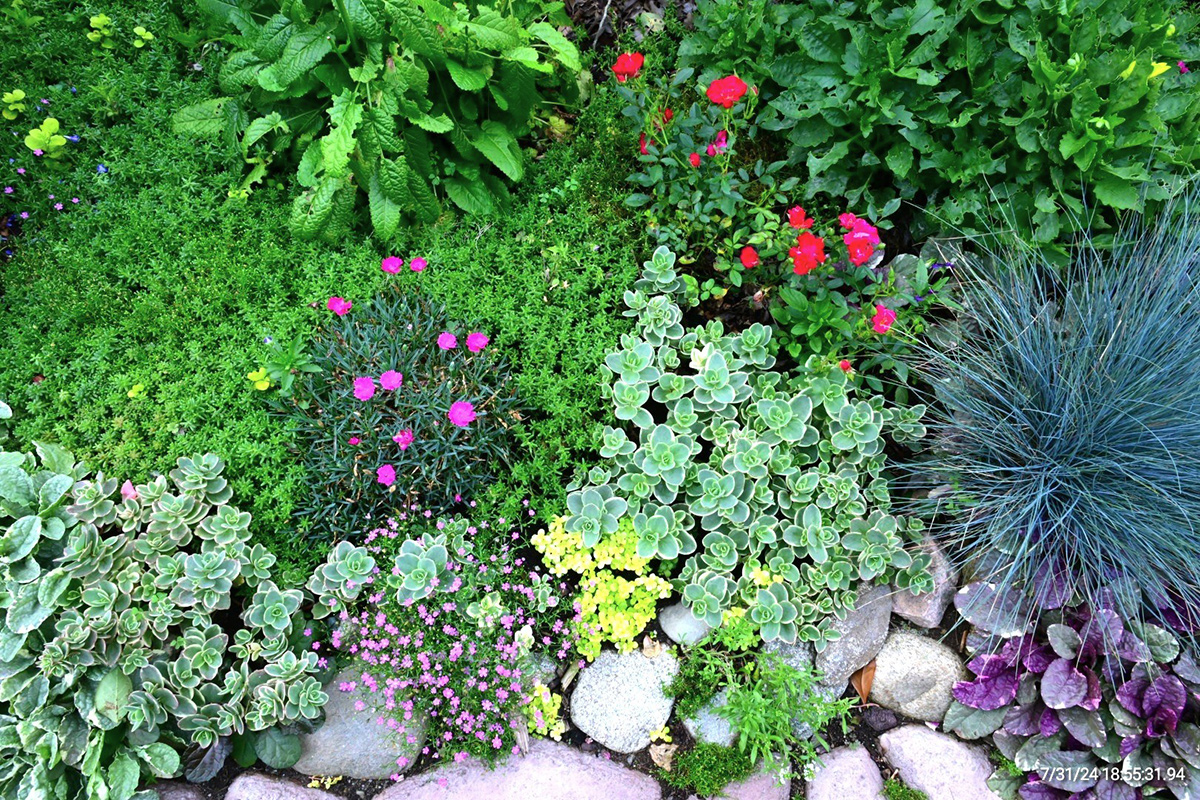 Close up view (July 31). The few yellow leaves on top left are some remaining creeping Jenny plants. The tiny pink flowers at the bottom are creeping baby’s breath (Gypsophila repens ‘Rosea’, Zones 2–9). They grow in gaps between rocks and pavements and come back every year by self seeding. Every year when I see the new seedlings with tiny needle sized leaves, I cleared some space around them and make sure they are not covered by bigger plants.
Close up view (July 31). The few yellow leaves on top left are some remaining creeping Jenny plants. The tiny pink flowers at the bottom are creeping baby’s breath (Gypsophila repens ‘Rosea’, Zones 2–9). They grow in gaps between rocks and pavements and come back every year by self seeding. Every year when I see the new seedlings with tiny needle sized leaves, I cleared some space around them and make sure they are not covered by bigger plants.
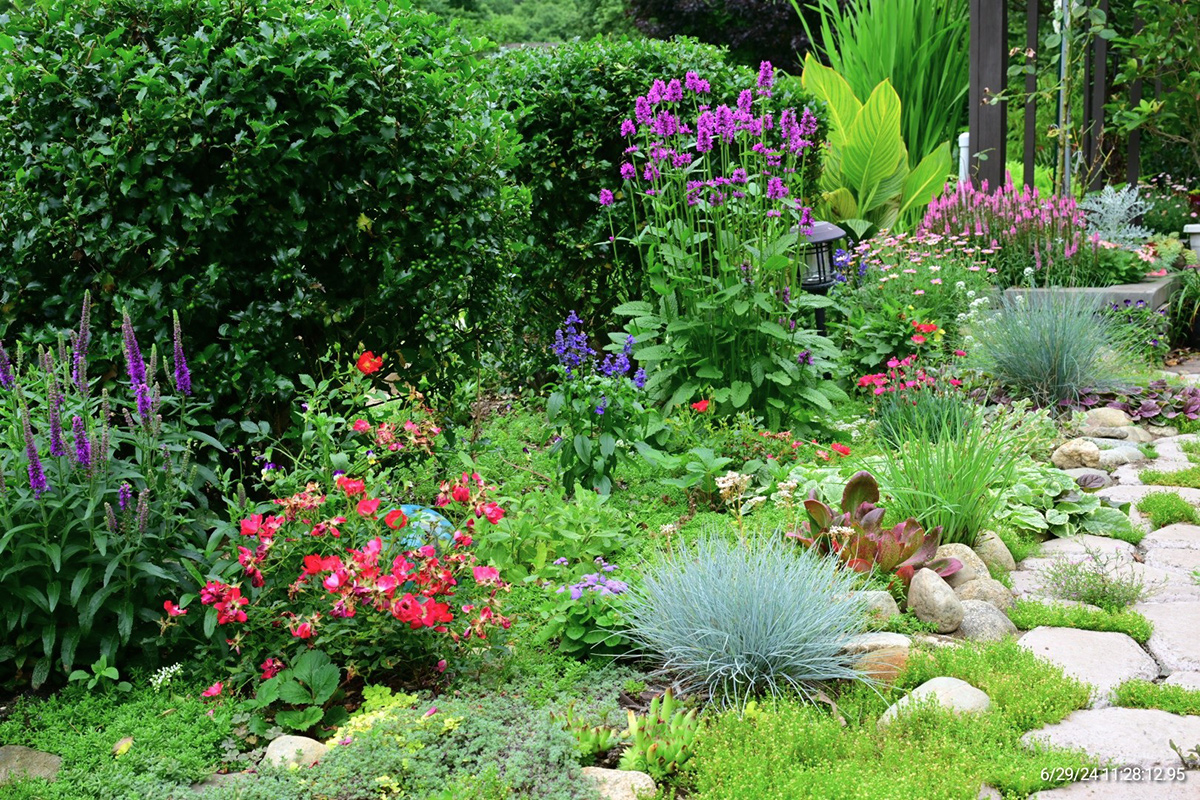 An earlier picture along the walkway (June 29). In bloom are veronica with their first flush of flowers, carpet rose, salvia and betony. Filling up the gaps of the pavement are mosses, uninvited but welcome!
An earlier picture along the walkway (June 29). In bloom are veronica with their first flush of flowers, carpet rose, salvia and betony. Filling up the gaps of the pavement are mosses, uninvited but welcome!
Thank you for sharing this incredible garden transformation with us, Tingshu! It’s inspiring to see how you overcome a challenge and create something even more beautiful and beneficial in the process.
Have a garden you’d like to share?
Have photos to share? We’d love to see your garden, a particular collection of plants you love, or a wonderful garden you had the chance to visit!
To submit, send 5-10 photos to [email protected] along with some information about the plants in the pictures and where you took the photos. We’d love to hear where you are located, how long you’ve been gardening, successes you are proud of, failures you learned from, hopes for the future, favorite plants, or funny stories from your garden.
Have a mobile phone? Tag your photos on Facebook, Instagram or Twitter with #FineGardening!
Do you receive the GPOD by email yet? Sign up here.
